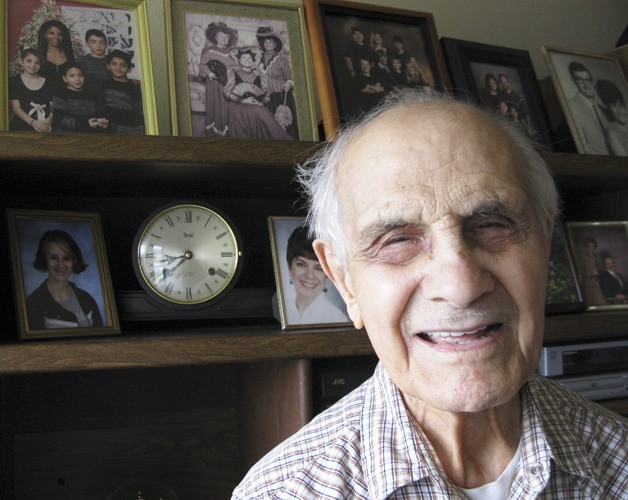Fiore Chevara often wonders where the time has gone.
“One-hundred years old?” Chevara was asked while glancing at the many collectible clocks that decorate his Auburn apartment. “It’s kind of surprising, but I really do not have any secrets as to why I’ve lived this long.”
For a connoisseur of clocks, time refuses to stand still, accelerating as one grows older.
The spry and humble man, affectionately known as “Fee” to family and friends, officially becomes a centenarian Sunday. A large family celebration will mark the milestone Saturday at Black Diamond, where Chevara was born to Italian immigrants and where his father, Antonio, once scratched out a hard living by working in the coal mines when the family moved to the Northwest in the early 1900s.
Appearing fit and considerably younger than his years, “Fee” is the last survivor of seven children who knew hardship, perseverance and the importance of close-knit family.
Generations of Chevaras live proudly in the Auburn area today.
Honest, loving man
“He has a loving heart, a great sense of humor,” said his daughter, Dee Dee Louise, who lives in rural Auburn. “He worked hard his whole life. He is honest, always willing to help others, always there for his family.”
Family roots trace back to Italy. Cheveras’ parents left their small town in the Abruzzi Mountains in 1906 to begin a new life in America. But they encountered hardship.
Antonio soon left the mines for the railroad. His wife, Concetta, soon died of an illness, leaving behind 9-year-old Fiore and six other children. Unable to care for all of them, Antonio temporarily placed some of his children in foster homes and orphanages.
Through all the separations, the family eventually would stay close and stay together.
Chevara would go his own way. As a young man, he began to “ride the rails,” which allowed him to see the country. He went to Yakima and other spots to pick apples and hops.
From his travels, Chevara remained true to the strong work ethic and discipline he learned from his father.
“He once told me, ‘When you work, you don’t talk,'” Chevara said. “I never forgot that.”
Chevara would settle in the Seattle area and marry Celia Cochran. They raised five children.
“Celia was Irish and English. … She was pretty, broad-minded and lovable,” Chevara said of his wife of 67 years who passed away several years ago. “She was a good wife and partner.”
Chevara was a good provider and a resourceful man. He first tried factory work, manufacturing wooden brush handles for a local company. He eventually settled on becoming an electrician, working for several companies over a 40-year career.
“I was a trouble-shooter,” he said of his trade. “I liked the freedom, the chance to go out to different places. I also liked to be the one who turned the lights on.”
Chevara and his family lived in Federal Way, owning a home near Van Asselt above Boeing Field for 17 years before the state took the property to build the freeway.
After his wife’s death, Chevara settled in Auburn to be close to family.
Chevara stays active today. While he no longer hunts and fishes, he stills tinkers on projects, takes daily walks, dabbles in photography and exchanges e-mails with family. He only recently surrendered his driver’s license.
A kind and good-natured man, Chevara enjoys each day as it comes. He enjoys being a part of an extensive family that includes 15 grandchildren, 26 great-grandchildren and four great-great-granchidren.
“Family is very important to him,” said granddaughter-in-law Laura Mathews. “Anybody he meets is important to him, and he’s very accepting of everyone.
“He has such a positive outlook on life and never complains. He’s just a neat guy.”
Chevara who has no regrets.
“I’ve had a great life,” he said. “I’ve just taken good care of myself. I do feel great, and I’m very thankful for that. The good Lord must have been watching over me.”


